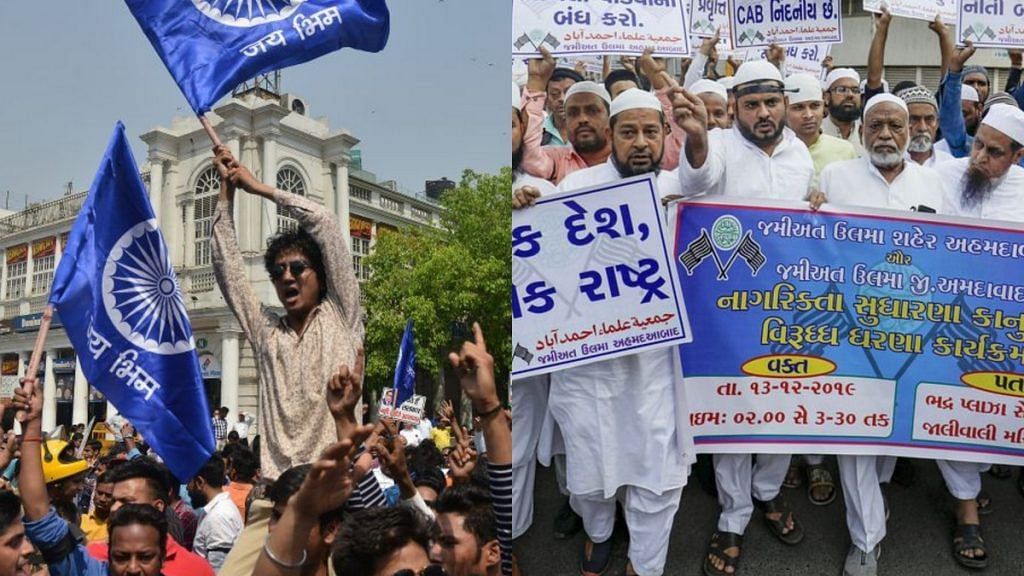There is a deep rot and monumental failure of imagination on part of a section of the political class advocating the Dalit and Muslim unity.
Much has been written about the debate around the recent changes in Indian Citizenship law. Arguments, both in favour and against the amendment, have expectedly missed the Dalit dimension that forms a fundamental part of this legislative alteration.
The opposition has been unsuccessfully toying with this idea of Dalit-Muslim unity for a long period of time now. With today’s announcement of having a permanent Dalit member in the Sri Ramjanmabhoomi Tirth trust, they would face another blow. What the opposition clearly fails to understand is that the Dalits are culturally, socially and politically the most important ambassadors of Hindutva on the ground.
Also read: BJP claims CAA helps Dalits. But lives of Jogendra Nath Mandal & Ambedkar say otherwise
Dalit plight in Pakistan, Bangladesh
And yet, there are attempts to misguide the Dalit community on the recent changes in the Citizenship Amendment Act. More than 80 per cent of Hindus in Pakistan are Dalits. The status of Hindus in both Pakistan and Bangladesh is an open secret. They are subjected to the worst forms of discrimination. Their plight was also highlighted by the International Religious Freedom Report released by the US State Department in 2011.
“In much of lower Sindh, Dalits constitute up to 70 per cent of the agricultural workforce. According to Khurshid Kaimkhani, a Left activist from Sindh, and author of what is probably the only book on the Pakistani Dalits, local landlords prefer to employ Dalits instead of Muslim because the former are less vocal and more docile. Hardly any Dalits own any land, he says, and they are entirely dependent on the landlords for their survival. There are no special government development schemes for Dalits,” observes Yoginder Sikand, who has authored several books on Islam, in his article Pakistan’s Forgotten Dalit Minority.
The mass exodus of Dalits from Pakistan to India has been a constant phenomenon. Only in 2013, then Chief Minister of Rajasthan Ashok Gehlot assured support to a number of illegal migrants who came from Pakistan. Congress party on multiple occasions in the past has expressed support to the illegal migrants from neighbouring Pakistan and Bangladesh on account of religious persecution.
Richard Benkin, an independent Human Rights activists, claims that the population of Hindus in the five-decade-old history of Bangladesh has come down from 30 per cent to less than 3 per cent.
It was a Dalit from India whose intervention and leadership led to the creation of Bangladesh in 1971. Gary Bass, a former American diplomat and the author of The Blood Telegram: Nixon, Kissinger, and a Forgotten Genocide, has called Babu Jagjivan Ram, the then defence minister in the Government of India, as the most hawkish minister of defence. The efforts of Babu Jagjivan Ram are deeply recognized by the government of Bangladesh, to the extent that he was awarded the highest civilian honour of the country. However, the condition of Dalits in rest of the subcontinent barring India is completely paradoxical to what Jagjivan Ram would have imagined.
“The Calcutta carnage was followed by the ‘Noakhali Riot’ in October 1946. There, Hindus including Scheduled Castes were killed and hundreds were converted to Islam. Hindu women were raped and abducted. Members of my community also suffered loss of life and property.” wrote Jogendra Nath Mandal, Minister of Law and Labour to Pakistan’s first Prime Minister Liaquat Ali Khan. Mandal is forgotten in the annals of history, primarily owing to his decision to join the cabinet of Pakistan. Considering the educational backwardness and social predicament of Dalits and Muslims, Mandal probably forged a chimaera of Dalit-Muslim unity, much before both Mayawati and Asaduddin Owaisi were born.
Also read: The Mayawati era is over. Bye Bye Behenji
Support from Dalit leadership
Mayawati, who is arguably one of the tallest leaders from the Dalit community across the nation with a substantial share in the votes, has also not been against the Citizenship Amendment Act. Jitan Ram Manjhi, former Dalit Chief Minister of Bihar also cancelled the rally he was scheduled to address along with Owaisi against the amendment. Ram Vilas Paswan, who is part of the NDA government, has given sufficient statements in support of the amendment. When the established Dalit leadership in the country is not opposing the amendment, then the misadventures of Chandrashekhar Azad Ravan will have little implications, as he is clearly not representing the sentiments of the community.
Many minority leaders and journalist from across Pakistan and Bangladesh, requesting anonymity has admitted to the atrocities faced by them in everyday interactions. Religious extremism has deep roots in rural and urban segments of both the countries and the socially, politically and economically deprived sections among the Hindus have welcomed the positive changes in the citizenship Act in India.
With the CAA now enacted, Dalits will have an option to return to the life of dignity and respect in India.
The author is an Assistant Professor at Patna University and Visiting Fellow, India Foundation. He is a member of the state executive committee, Bharatiya Janata Yuva Morcha, BJP’s youth wing, Bihar. Views are personal.
